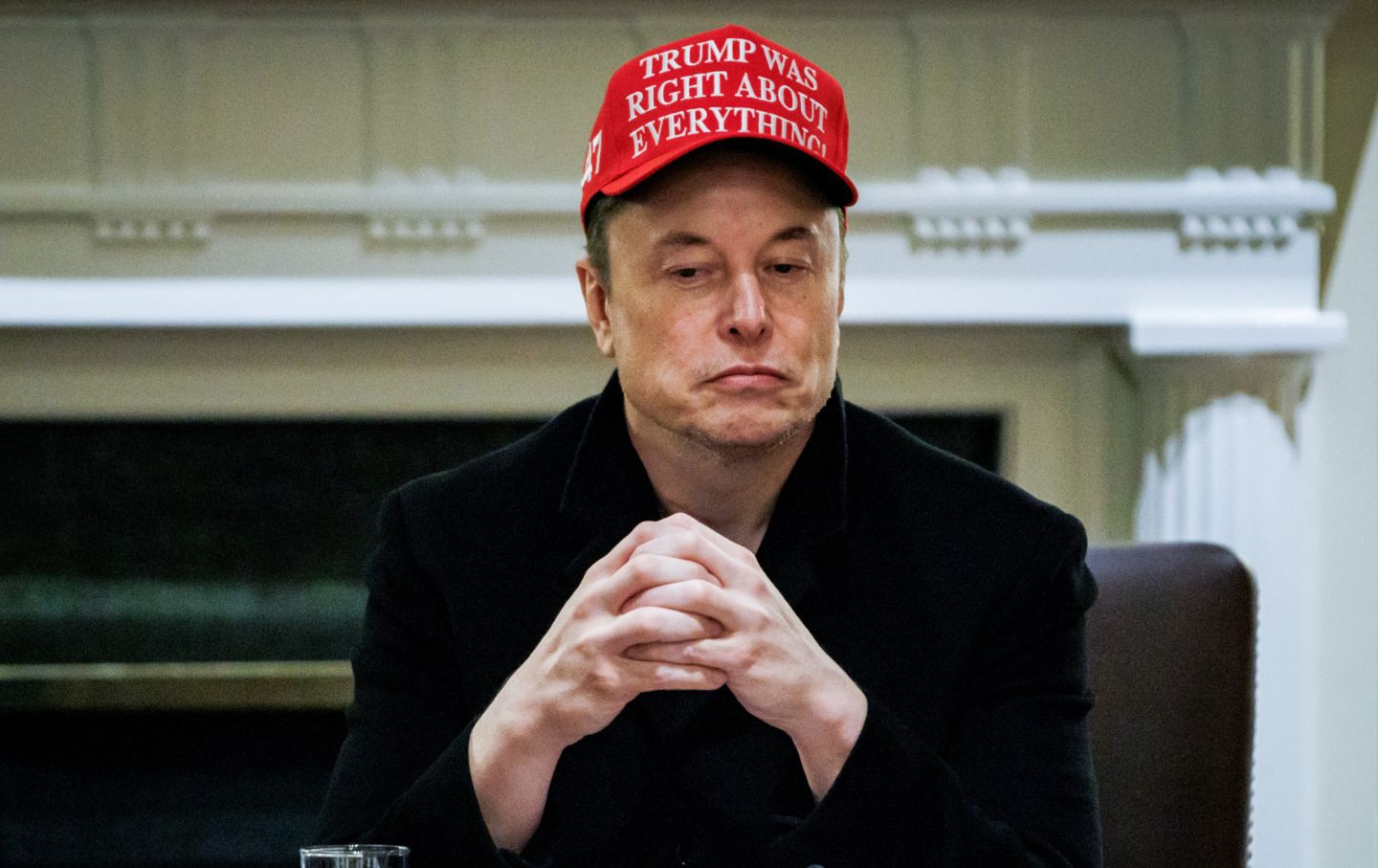Dismantling the civil service isn’t just a tactic. It’s a necessity for their efforts to entrench white racial and economic supremacy.

Elon Musk wields a chainsaw as he leaves the stage at the Conservative Political Action Conference (CPAC) on February 20, 2025.
(Andrew Harnik / Getty Images)
The civil service is, and has long been, disproportionately Black. Almost 20 percent of federal workers are African American, compared to just 12 percent of private-sector workers and 13 percent of Americans overall. A 2011 study found that Black Americans were 30 percent more likely than any other group of Americans to work in public service. That ratio can be linked to the legacy of racism that effectively barred Black folks from private industry for most of America’s history. In contrast, the civil service offered not just jobs but also careers, with advancement opportunities and a rare path to the middle class.
From 1863 through Reconstruction to the end of the 19th century, hundreds of Black Americans—many of them formerly enslaved—worked for the Postal Service. By 1940, the weekly earnings of Black postal employees put them in the top 5 percent of all African American workers. Today’s Black civil service workers—who are much more likely to be unionized than their private-sector counterparts —earn 25 to 50 percent more than Black Americans in other fields. Even the racial wealth gap, with its roots in enslavement and centuries of discrimination, is narrowed by the civil service. A 2020 Center for American Progress study found that white households in the private sector hold up to $10 for every $1 held by Black households, while in the public sector, that gap shrinks to about $2 to $1.
Far from being a redoubt of DEI-driven incompetence, the civil service is, broadly speaking, what happens when hiring, salaries, and promotions are more tightly tied to skill and expertise than to racial (read white) and gender (read male) favoritism. Antidiscrimination policies, such as the Civil Service Reform Act of 1978, were not only instituted but enforced—and reinforced by executive orders across presidential administrations. The effort toward fair(er) hiring dates back to 1883, when the Pendleton Civil Service Reform Act established the civil service exam, ending the spoils system that prioritized partisan loyalty over qualifications. This is not to suggest that the civil service is free of racism or bias; nothing in America is. But it’s one of the closest things we have to a functioning, competitive, nonpartisan meritocracy.
And that’s exactly why Donald Trump and Elon Musk want to destroy it. For all their blather about merit, they actually loathe it—particularly when its outcomes even mildly threaten the racial status quo, which their sense of self-worth requires be preserved.
The current Trump-Musk assault on the public sector is both racial and ideological—an extension of the white supremacist authoritarianism driving their self-serving agenda. Dismantling the civil service isn’t just a tactic; it’s a necessity for their efforts.
Criticism of civil servants quite literally dates to ancient times, and history is filled with figures promising a new dawn by attacking old bureaucracies. But in our recent past, the civil service, precisely because of its nonpartisan, meritocratic nature, has been a target of racists and authoritarians in particular.
In 1913, Woodrow Wilson—who coined “America First” a century before Trump adopted the slogan— resegregated the federal workforce, which had been racially integrated since Reconstruction. Black workers, who were then more than 10 percent of the federal workforce, found themselves suddenly “herded to themselves as though they were not human beings,” as W.E.B. Du Bois wrote at the time, noting that “one colored clerk who could not actually be segregated on account of the nature of his work…consequently had a cage built around him to separate him from his white companions of many years.”
Hundreds more were fired, demoted to menial positions, or transferred to areas planned for closure—with Wilson personally dismissing 15 of the sector’s 17 Black supervisors, who were replaced with white men. (Does any of this sound familiar?) Federal job applicants were newly required to submit photographs, ensuring that Black candidates would be screened out. Segregation in government employment would stand until it was ended by Harry Truman, 35 years later.
Two months after he took power in 1933, Adolf Hitler—perhaps inspired by Wilson’s example, as he was by so much in Jim Crow–era America—instituted the 1933 Law for the Restoration of the Professional Civil Service, better known as the Civil Service Law. He claimed that Germany’s federal workforce was rife with unqualified political appointees and required a “cleansing process” to rid the government of corruption by ideological “enemies of the state”—a key to “restoration of a national professional civil service and for the simplification of administration.” Under the guise of government efficiency, the legislation legalized the purging of Jews, Socialists, Communists, Social Democrats, and other “politically unreliable” workers. They would be replaced with Nazi loyalists, who in turn helped speed the state’s nazification.
Trump and Musk—and DOGE’s racist edgelords and incels—with their civil service purges, have taken up a task that is reminiscent of those predecessors. While they have waged a broad assault on the public sector—fully aware, no doubt, of the significant Black presence in its ranks—they have also made a point to target Black employees directly. This is especially obvious in their highly publicized firings of “diversity, equity, and inclusion” workers, whose work specifically focused on expanding opportunities for Black advancement, and who are the sole civil servants dismissed explicitly for the nature of their work.
When, under the guise of “government efficiency,” Trump claims that the federal workforce needs gutting because it’s overrun with unqualified “radicals, zealots and Marxists” whose diversity efforts are “un-American” and a threat to the country, or Musk calls workers who have dedicated their lives to service “parasites,” the historical parallels are clear.
But these attacks also feel like part of an insidious effort to halt, or perhaps even undo, the tenuous economic progress of Black Americans by intentionally cutting off a vital route to the middle class. It’s there in the seething attacks on civil servant earnings as somehow undeserved, as when Musk wrote that public employees were “pretending to work while taking money from taxpayers.” On another occasion, the tech billionaire claimed that federal workers who are “used to being paid a lot for nothing” would now “have to get a real job” (like “maker of constantly exploding cars,” perhaps?). JD Vance has characterized public-sector workers as “living off the generosity of the American taxpayer,” as if they aren’t themselves taxpayers. (It’s worth noting that there’s a cap on public-sector pay at $162,672. Elon Musk makes an estimated $23 million an hour.) This isn’t just about cutting jobs and federal debt—it’s about eliminating Black Americans’ pathways to mobility and influence. By dismantling those sectors, this administration isn’t just shrinking the workforce but strategically discarding mechanisms that have helped Black workers attain economic security.
What’s more, the Musk-Trump alliance is exploiting a racist idea that dates back at least 60 years. Republicans’ ideological commitment to “small government” didn’t fully develop until the federal government had taken up programs that disproportionately aided Black and poor folks—school desegregation, civil and voting rights, and anti-poverty efforts. An increasingly reactionary right responded by racializing the idea of government itself. Conservative critics began to “implicitly identify [the federal government] as representing blackness and the interests thought most directly to advance black life,” as David Theo Goldberg writes, and because Black advancement is always treated as the unfair and undeserved yield of federal aid, government “increasingly came to be conceived as a set of institutions supporting the undeserving.” (Segregationist George Wallace, according to one reporter, “gave every hearer a chance to transmute a latent hostility toward the Negro into a hostility toward big government.”) Thus, government was portrayed as one big scam, designed to drain money from tax-paying, hardworking—and therefore, presumptively white—Americans. The federal workforce, in its disproportionate Blackness, could then be cast as lazy, inefficient, and undeserving of its position. Only anti-Blackness of this sort could portray jobs—meaning literal work—as “entitlements” or “handouts.”
This idea was echoed in the late and very-not-great Rush Limbaugh’s claim that public sector workers “don’t produce anything,” but instead “live solely off the input of the private sector.” As well, bitter old codger Pat Buchanan’s complaint during the Obama years about a “racial spoils system in federal hiring.”
Popular
“swipe left below to view more authors”Swipe →
Ronald Reagan, a rabid anti-unionist, told an AFL-CIO audience in 1981, “You believe in the work ethic, but subsidize a government that does not.” Soon after, he assembled a DOGE-esque committee—comprising 200 private sector C-suiters, but not a single civil servant—tasked with finding “fraud, waste and abuse” in the federal workforce. One year later, the president declared that the effort had “already found thousands and thousands of people who have been dead so long as 7 years and are still receiving their benefit checks.”
“I’ve heard of cradle to grave security,” he quipped, “but cradle to the pearly gates is something else. Who said you can’t take it with you?”
The numbers, of course, were trash. Most of the committee’s predicted savings were not only hugely exaggerated but legally unworkable. Alas—such are the woes of having people who have no fucking idea what they’re doing try to run the government like a business! (Again, sound familiar?) But the goal was less real reform than a chance to paint the government as corrupt, inefficient, and stuffed with undeserving (read: Black) workers. The point is, Reagan fired some 11,000 air traffic controllers, gutted unions, tripled the national debt, and left a shameful legacy of Black economic devastation and civil rights rollbacks.
Astraight line connects Reagan’s stoking of white racial grievance to the current administration. Now we have Musk, the world’s richest “welfare queen”—having received nearly $40 billion in government handouts that allow him to spend his days retweeting neo-Nazis and “play[ing] video games” on his government office’s “massive TV”—accusing civil servants of gaming the system. There’s Trump, a convicted felon whose golfing has already cost more than $18 million in tax dollars, claiming that most civil servants “don’t work at all. Many of them never showed up to work.”
The hypocrisy would be hilarious if the consequences weren’t so severe. Take Musk’s claim that millions of 150-year-olds were still getting Social Security payments—based on a misreading of data by the DOGE team, who are too young to recognize the ancient (in tech terms) programming language used. Or how the math on DOGE’s purported savings is itself fraudulent, as when a cancelled $8 million contract was wrongly touted as $8 billion in savings. Musk and Trump are right that there are people causing inefficiency and ineptitude in government. They just don’t seem to own any mirrors, which would help them better identify exactly who those buffoons are.
But again, none of this really matters. This project is far more about propaganda than policy—at least, policy other than white racial and economic supremacy. Billionaires need the country to despise what Trump labels “diversity, equity and inclusion nonsense” even as they golf, game, and hoard taxpayer-funded riches. The goal of this project isn’t just to make cuts but to further entrench the idea that a workforce that’s too Black is inherently incompetent—and to poison the idea of a diverse public sector altogether. So much white resentment is being stirred up not just to shrink government but to privatize public services, crush unions, and restore a racial order where federal power is wielded against Black communities.
There will be long-term consequences for the country overall, but especially for its Black citizens. Wilson’s segregation policies humiliated and demoralized Black workers—both those newly segregated in their jobs and those locked out of the only stable work for Black folks. (Booker T. Washington, after a 1913 visit to DC, wrote, “I have never seen the colored people so discouraged and bitter as they are at the present time.”) But the damage wasn’t just psychological—it had a measurable economic impact. A 2020 Berkeley business school study concluded that Wilson’s resegregation of Black and white federal workers increased the racial pay gap “by about 7 percentage points between 1913 and 1921—a big effect that increased the existing earnings gap by almost 20 percent.” Those lost wages didn’t just cause individual hardships. They equaled wealth never accumulated, investments never made, and financial security never passed down. By cutting off well-paying jobs, Wilson’s policies helped further deepen the racial wealth divide into a chasm that exists to this day.
Trump administration officials blithely suggested to fired public service employees that they simply “find a job in the private sector,” but for Black public workers, that’s easier said than done. A 2015 study shows that it’s far harder for Black civil servants who lose their jobs to find new jobs in the private sector. “The loss of one good government job could push a whole black family out of middle-class stability into lower-income precarity,” as Bryce Covert notes in a 2019 piece, “permanently shifting economic demographics for generations.”
The damage will extend far beyond individual families. When the fallout comes, as history proves it inevitably always does, America won’t blame Trump and Musk, the architects of this destruction. Instead, perhaps a few decades from now, another effort at correction will be attempted, until it is ultimately attacked as Black racial favoritism, while the truth is quite deliberately hidden from public memory. Our current era of vicious anti-Blackness will be recounted not as one full of deliberate attacks to undermine Black opportunity—but as yet another chapter of African American “failure” to achieve equality. Which, in a way, was the goal the whole time.



